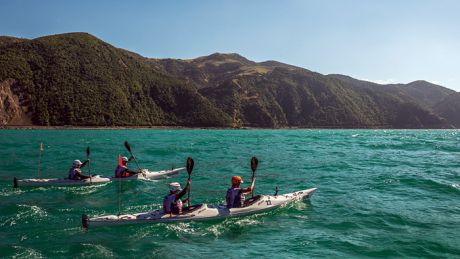Adventure racing tips
Essential facts and expert adventure racing tips

Sign up for workout ideas, training advice, reviews of the latest gear and more.
You are now subscribed
Your newsletter sign-up was successful
Adventure racing hits the fitness sweet spot. It strikes a perfect balance between the individual challenge of a marathon, the variety of a triathlon and the strategic collaborative skill required in team sports. Adventure races can span a few hours or a few days, cover several kilometres or an entire coastline and challenge you to keep your mental focus throughout.
These multidiscipline events, which typically include off-road running, mountain biking and kayaking sections, test your orienteering skills to navigate between a series of checkpoints or simply get from A to B in the fastest time possible. Welsh polar explorer Maria Leijerstam, the first person to reach the South Pole by cycle and organiser of the Burn Series of races in the UK, reveals the secrets you need for adventure race success.
Fit for function
‘Kayaking relies on a strong core, back and shoulders. To generate full-body, functional power, comobine dynamic and isometric core moves. Do three minutes of sit-ups, aiming to do as many as possible, then finish with a plank to failure.
Hit the wall
‘Endurance and efficiency are vital, especially for the bike. Use a Wattbike in training because you’ll learn to use your hamstrings (on the up-pedal) as much as your quads (down-pedal). For endurance, I do wall squats, aiming for two-minute holds with a minute of rest as many times as I can.’
Lead from the front
‘Tactically, it’s better to get out in front and then pace yourself than to start slowly and try to catch up. To help me sprint to the front I do a mix of endurance and interval training. I do weekly 20km runs, interspersed with short 50-100m sprints. Running off-road strengthens every joint, ligament and muscle in your legs, helping prevent injury.’
Recover on the go
‘Whether it’s a multi-stage event or a short race with quick transitions, you can’t afford to lose any time resting and recovering. To stay hydrated and keep my salts up I rely on salt and vinegar crisps and salted liquorice. If camping is involved, freeze-dried meals are essential. To aid recovery in your leg muscles between stages, sleep with your legs elevated.’
For details of Burn Series adventure races around the UK visit burnseries.co.uk
Sign up for workout ideas, training advice, reviews of the latest gear and more.
Lost and Found
Master the art of orienteering with tips from former Royal Marine PTI Sean Lerwill
Use route cards
‘Before setting off from the start line, identify and write down your route and the distance to each checkpoint. Highlight key landmarks you should pass, such as streams, railway tracks and roads, to keep you on course.’
Beware off-road
‘If you have a choice between the long route on a road or marked path or a shortcut across uncharted territory, use the former. There could be unmarked obstacles that will scupper your corner-cutting and sabotage your race time.’
Learn your pacing
‘In training, learn how many steps it takes you to cover 100m on the flat, uphill and downhill. Being able to judge distances covered without constantly referring to the map will help you make up serious ground on the competition.’
